
Village Adoption Programme
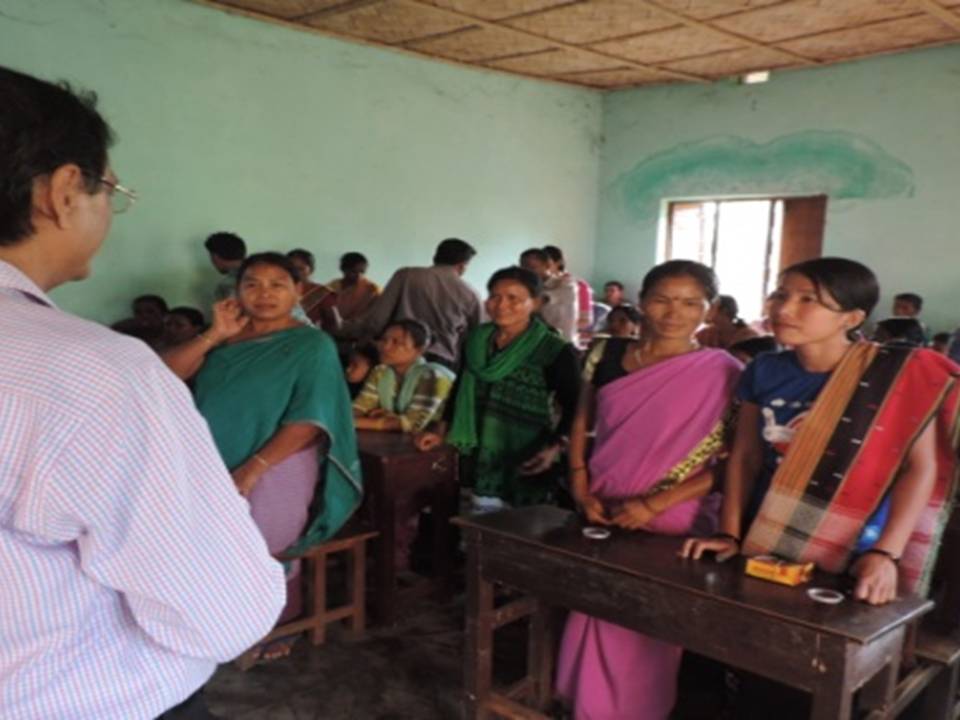
Brief overview :
Village Adoption relates to work along with the community at grass root level, enabling/empowering them for pursuing the goal of sustainable development of the village and learning with the communities. The Village Adoption Programme is implemented to equip and familiarize the faculty with the socio-economic dimensions of the rural farmers, status of sustainable use of natural resources, priorities and innovative effort of the rural communities for sustainable development and; inspire the community for self-help to come out with strategies, methodologies, processes to develop sustainably and create cohesive communities where every individual gets equal opportunity to realize his/her potential. In addition, the villages are to be developed as a reference model village for the other rural communities. Through this process the faculty also learn, document the nitty-gritty of the process which can help them in revising strategies for better training and come up with new models of rural development for replication elsewhere by all stakeholders. College took initiative for village adoption programme in 2011. Later, under Mera Gaon Mera Gaurav (MGMG), the flagship programme of Govt. of India; all the faculty members and non-teaching staff were put under six different groups for village adoption. Different activities have been going on under different groups with close monitoring and supervision.
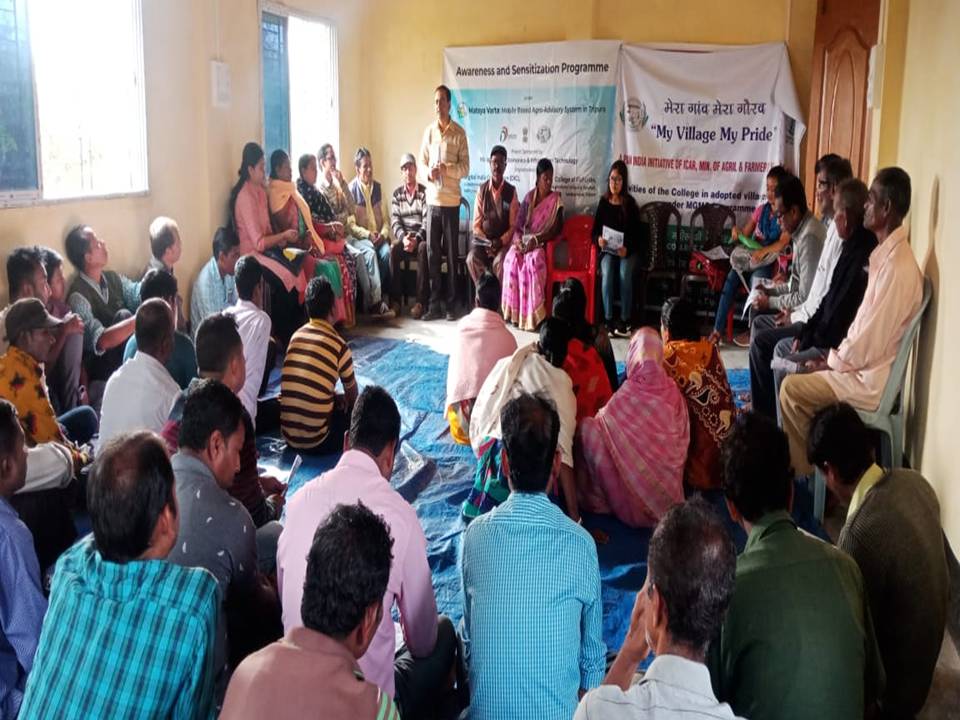
Objectives:
- To inspire the rural community to conceptualise their problems, identify the solutions, designing the implementation plan, and mobilize the resources for sustainable development to make the village community self-reliant.
- To empower the farmers by increasing knowledge, improving skills and inculcating appropriate attitude through extension intervention
- To coordinate partnership and networking tie up in convergence mode with various stakeholders for the effective management of the development activities
- Sustainable socio-economic development of farm families through increasing farm production by introducing scientific farming practices
Click here to know more about the Village Adoption Programmes conducted so far
Extension Publication
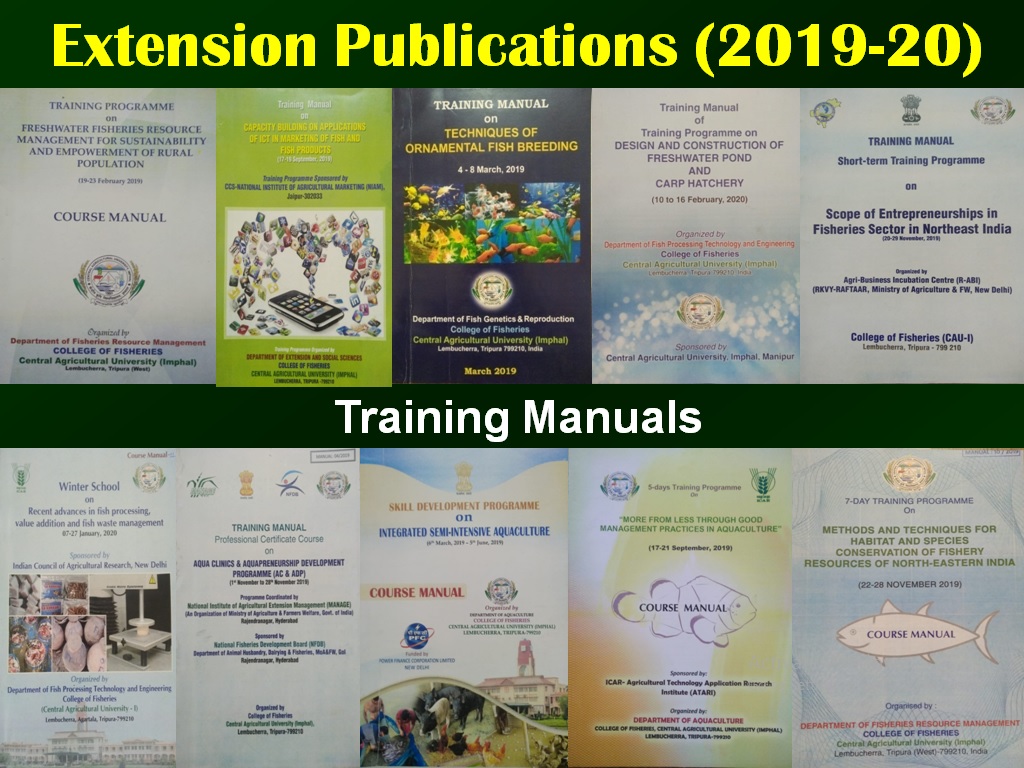
Brief overview :
Extension publications are learning resources that are subjected to provide need based and timely information to the intermediate and end users. These publications help the users as a reference material of the training, demonstrations and other extension activities. Extension publications are to be published in good quality print and well prepared audio/visuals, preferably in local dialects. Generally, the printed extension publications include leaflets, folders, pamphlets, poster, bulletins, booklets, farm magazines, training manuals and farm journals whereas electronic farm publications include audio and video files. College has taken several initiatives since its inception to publish different extension publications for the benefit of farming communities, line department extension professionals and other related stakeholders.
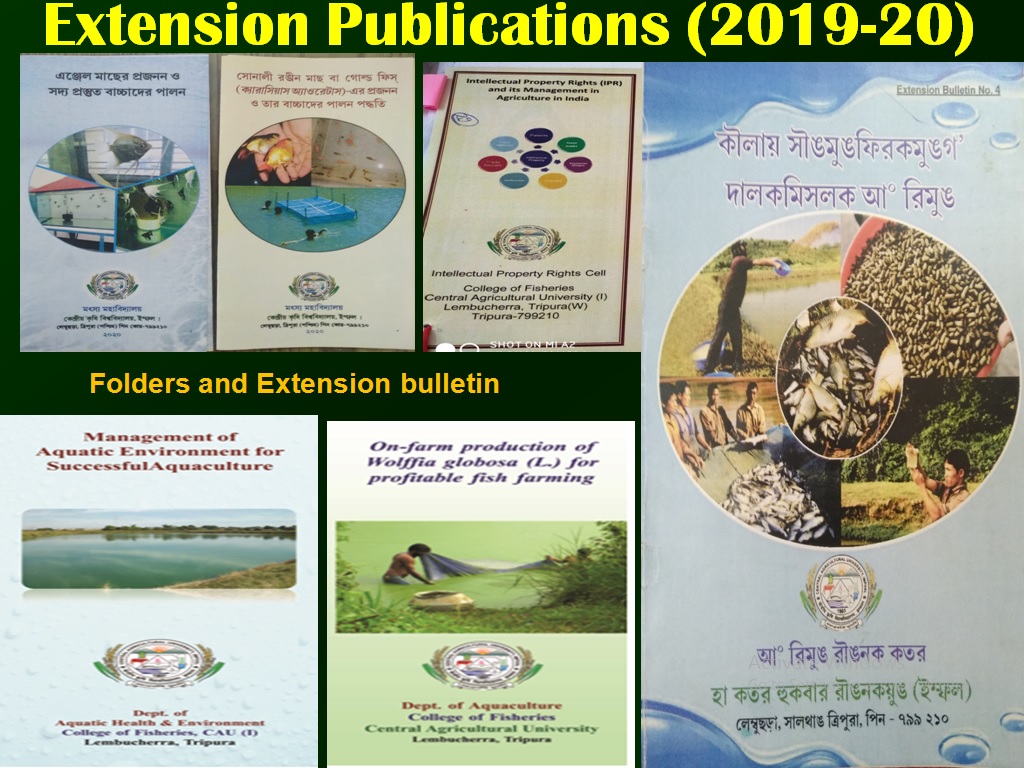
Objectives:
- To facilitate the intermediate and end users as learning resources to provide need based and timely information.
- To reinforce the learning received through training, demonstrations and other extension activities
- To help the users as a reference material for future use.
Click here to see the list of Extension Publications done so far in chronological order
Training Programme

Brief overview :
Training is a teaching or developing in oneself or others by imparting knowledge and skill to develop specific and useful competencies. It helps in improving one’s capability, capacity, productivity and performance .College of Fisheries, Lembucherra has been conducting both on-campus and off-campus training programmes every year. These trainings are especially conducted for farmers, farm women, rural youth, entrepreneurs and extension functionaries on different aspects of Fisheries viz., Aquaculture, Value addition of fish and fishery products, Seed production, Disease management, etc. Different trainings and demonstrations are also conducted for the capacity building of the extension functionaries regarding recent development in farm sciences to make them updated and well equipped with knowledge and skill for extension activities. Moreover, the college has also been conducting different seminars, symposiums, workshops etc in the campus and in online mode as well for sharing of knowledge and skill in agricultural sciences among the faculty members, scientists, research scholars and students throughout the country.
Objectives:
- To augment the transfer of technology process of scientific farm information for intermediate and end users.
- To arouse interest among the participants and generate demand for information on various scientific farm practices.
- To impart the need based and location specific knowledge and skills among the farming communities.
- To share the knowledge and skills in recent development of farm sciences among the scientific fraternity.
Click here to see the List of Training Programmes done so far in chronological order
Interface Meeting
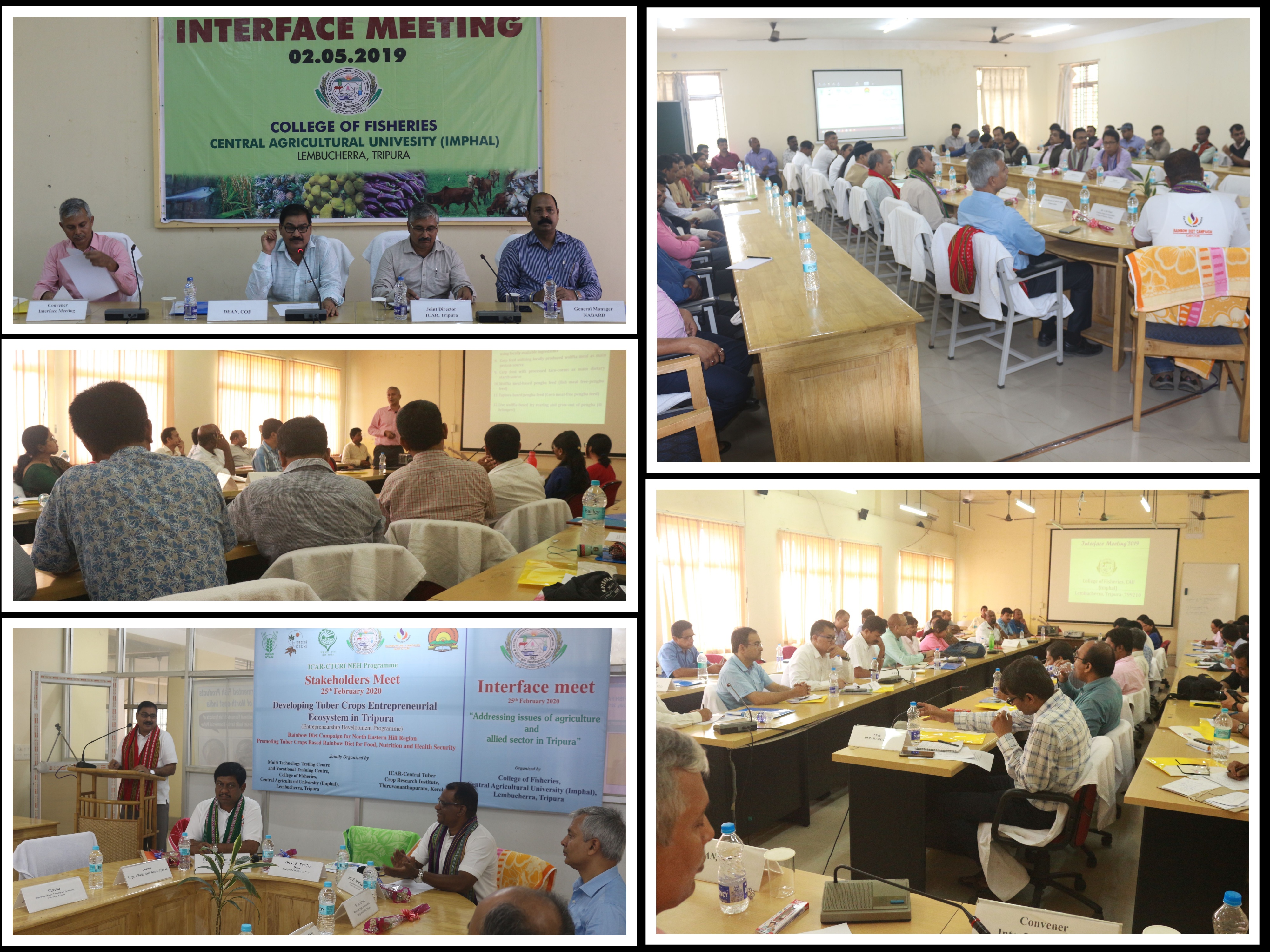
Brief overview :
Interface meeting in agricultural universities is an indispensable activity, where two or more systems / organizations meet each other and discuss different issues related to performance and future strategies of research and extension activities in convergence mode. College of Fisheries has been conducting interface meetings every year with the faculty members of the college, representatives from line departments, KVKs, ICAR-NEH Region-Tripura Centre, Financial Institutions, NGOs, Farmers’ Club, Cooperative Societies and other relevant stakeholders. In the meet, action taken report of the previous year’s recommendations are discussed and strategies & thrust areas for the research and extension issues for the coming year are prioritized through bottom-up approach as a part of participatory planning process.
Objectives:
- To establish functional linkage with different stakeholders for research and extension activities in agricultural sciences.
- To appraise the different ongoing research and extension activities of the college.
- To prioritize the location specific thrust areas for research and extension issues in NE region through bottom-up approach as a part of participatory planning process.
Click here to see the List of Interface Meet done so far in chronological order
Vocational Training Programme
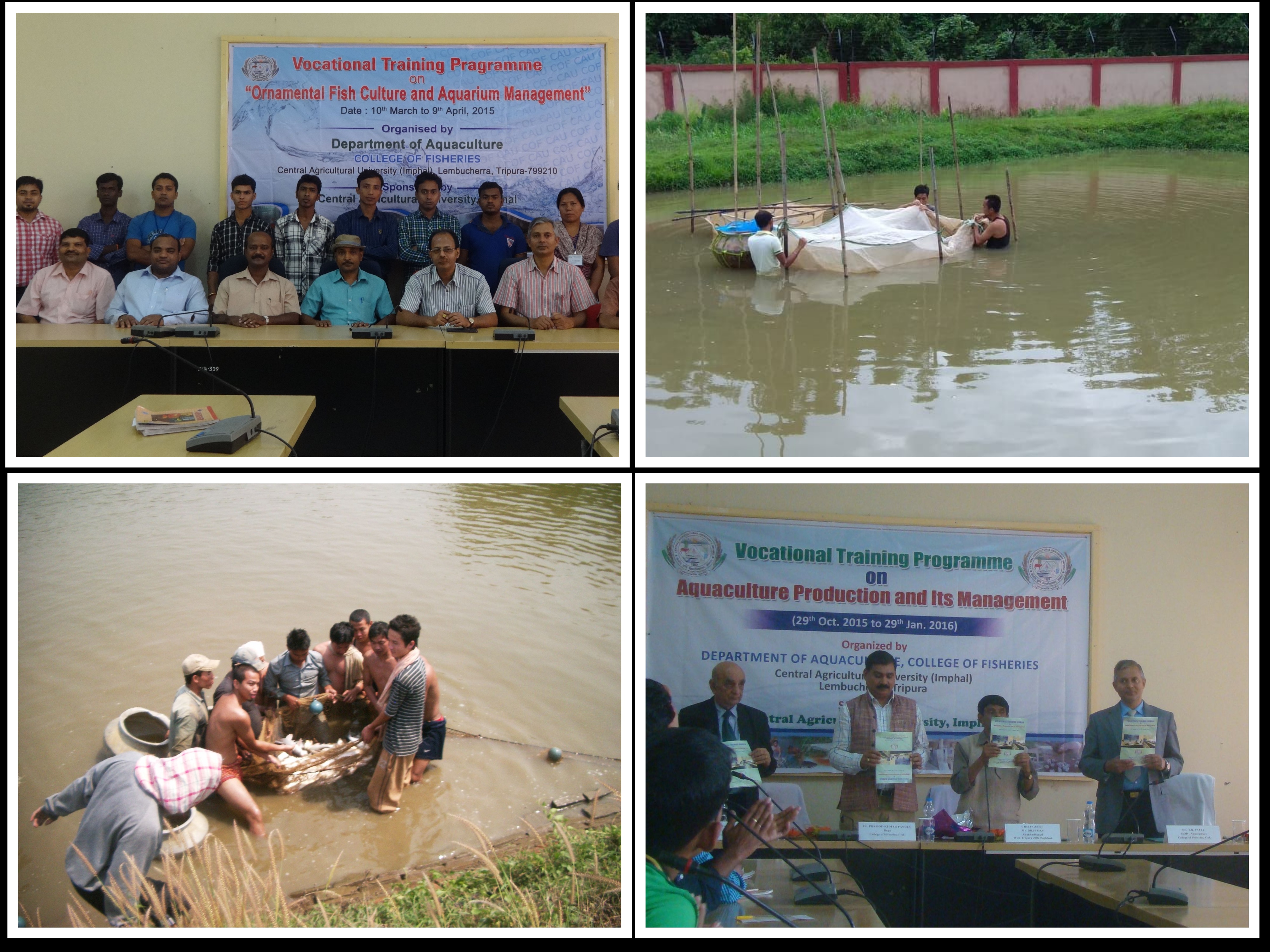
Brief overview :
In recent times, a considerable numbers of farmers left farming (7.1%) and there is an increase in numbers of wage earners (3.5%) over a decade from 2001 to 2011 as envisaged in Census of India. The situation in the North Eastern region of the country is also no exception. It has been creating a serious impact on the rural economy. Thus, it is essential to impart skill oriented training to the rural populace to make them self employed and generate a sustainable livelihood system in the rural areas. It will also help to slow down the migration process of the rural farming communities from rural areas to urban areas. In this line, the college has been conducting different vocational Training programmes on different aspects of Fisheries and Aquaculture. The main emphases of these training programmes are to provide hands on training and exposure to the rural youth in different farm businesses. These youths are encouraged and supervised to start up their own venture pertaining to fish farming and other related activities.
Objectives:
- To provide practical knowledge on Fisheries, Aquaculture, and other related farm business activities.
- To give hands on exposure and training to the unemployed rural youth for skill development.
- To encourage and mobilize farmers and rural youth to take up fish farming and other related ventures.
- To develop entrepreneurial skills among the farmers and rural youth
- To facilitate the farmers and rural youth to take up farm business enterprises
Click here to see the List of Vocational Trainings done so far in chronological order